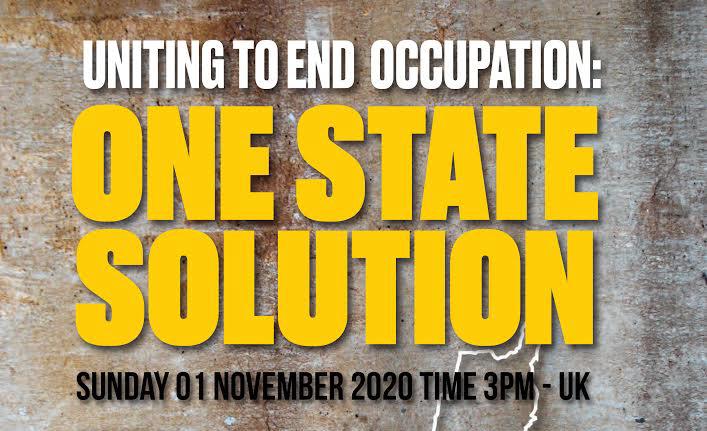WATCH THE FULL WEBINAR HERE:
Chaired by Nargess Moballeghi, IHRC held a webinar on Sunday 1 November 2020, ‘Uniting To End Occupation: One State Solution’, to discuss the subject of a One State solution for Palestine along supporting organisations:
- Scottish PSC
- BRICUP
- Inminds Human Rights Group
- Jewish Network for Palestine
- Ahlulbayt Islamic Mission
The failure of the Two state solution, due to the destructive actions by Israel, and continued building of illegal settlements on Palestinian land, has brought about renewed interest in the Single, democratic state solution to the settler-colonial conflict in Palestine.
This solution was the official position of the PLO until 1988, and is the only solution which offers equal rights for all in Palestine, and an end to the ravages of militarised Apartheid.
Four activists with life-long commitment to a just and peaceful solution to the conflict will be exchanging views about the current situation, and the potential of this solution which is greatly influenced by the end of South African Apartheid.
Speakers include:
• Professor Dr. Muhammad Marandi
• Awad Abdl Fettah
• Dr. Ghada Karmi
• Michel Warschawski
First to speak was Dr Marandi:
Ironically, the morality or immorality of the existence of an apartheid regime in Palestine has been reversed. In other words, Europeans and Americans justify their immoral support of racism and apartheid in Palestine as being the moral position. The subjugated people of Palestine are demonised as terrorists or as people who belong to the non-democratic world, whereas Israel is of the democratic world.
This is the exact same position that Western countries took towards apartheid in South Africa. Nelson Mandela who was in prison for 27 years and the African National Congress and other the political parties that were affiliated with the black majority and resisting against apartheid in South Africa, were perceived as terrorists and terrorist organisations, until 2008. So, the US and Europeans were supporting the apartheid, racist and colonial regime in South Africa, just as they are supporting the apartheid regime in Palestine today.
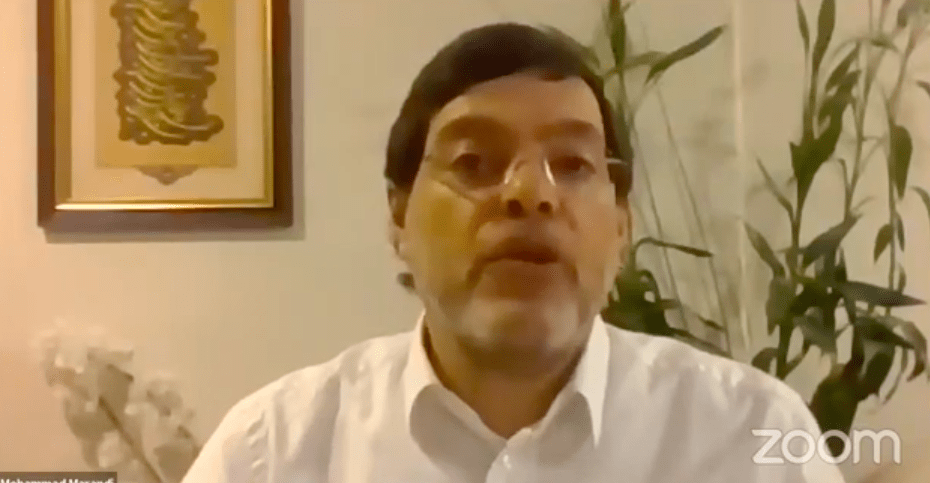
Opposition to apartheid is increasingly being attacked as anti-Semitism, a powerful tool, that even the leader of the Labour party was suspended because of this ridiculous accusation. Ironically western regimes are the ones who have been supporting extremist groups and governments in our region that have taken anti-sematic positions. In other words, ISIS and Al-Qaeda and similar groups have a history of being supported by western regimes. There is ample evidence of this, such as the 2012 Defence Intelligence Agency document that was partially released shows that the US knew that its regional allies were supporting extremist groups in Syria, that they were attempting to create a Salafist entity between Syria and Iraq and according to General Michael Flynn, the head of the Defence Intelligence Agency at the time, the US supported these efforts.
So those extremist groups that have used the language of anti-Semitism have been supported by Western intelligence agencies.
But the bulk of the anti-hegemonic movement in the region, whether secular, religious or nationalist, has always been very clear that the issue of Palestine has nothing to do with anti-Semitism or Jews. A portion of indigenous Palestinians are in fact Jewish. The objection to apartheid in Palestine by Muslim, Christian and many Jews across the world, by Hindus, secularists, nationalists, leftists, progressives, all have to do with the same issue of confronting apartheid in South Africa.
While things seem dark today, I personally believe there are 2 important points that give us optimism:
- The two-state solution is dead. This dishonest façade that we knew from the beginning was never going to be brought about, is finished. The Israeli regime has conquered the West Bank so much that no one can realistically speak about a two-state solution. It was never a real objective, rather it was to pacify those who are anti-apartheid, to give Israeli regime more time to colonise.
- The relative decline of western power. Even though Trump has forced dictatorships in this region through recognising Israel, we know these regimes have good relations with Israel. Aside from a couple of exceptions, most of the governments of the Islamic world are aligned with US policy on Israel. However, western hegemony is on decline, and with this reality that the Israeli regime is being seen for what it is, as western power decreases, its regional allies are going to be increasingly vulnerable which gives greater space to the public, and the public is overwhelmingly in support of the Palestinian cause. While months or years ahead will continue to be difficult, the future is not dark. The younger generation must continue to push for the dismantling of apartheid in Palestine.
Awad Abdl Fettah, a political activist and writer based in Haifa, was next to speak:
The demise of the two-state solution has accelerated our campaign. The Palestine-Israel conflict, and I say conflict with reservation because it is not a conflict, it is a unilateral process centred on colonialism led by a colonial movement which invaded Palestine and displaced the indigenous people. To go ahead with a one democratic state, we need to reread the Zionist project and restore the terminology that was used until the singing of the Oslo accords so that we can derive the right resolution to the Palestine question. The problem in Palestine was created outside of Palestine by capitalist countries; they came to Palestine to simply build a base for those imperial powers to control the Middle East and the Arab world. So, I have always thought and have been affiliated with a one democratic state from my youth and I was involved in a small nationalist Marxist movement called the Children of the Earth which advocated for a one democratic state and considered itself part of the Palestinian national movement and the PLO; we considered the PLO is a representative organisation for all Palestinians including those that survived the ethnic cleansing by Israel in 1948.
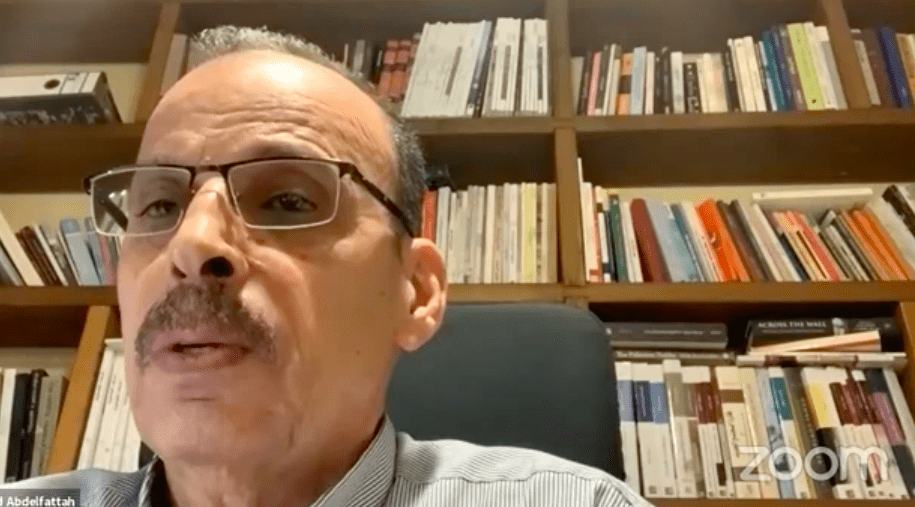
We were consistent with the idea of a one state solution. Today, more and more voices are supporting the idea of a one state solution which is good. Although Palestinians since they abandoned the anti-colonialist struggle, they have lost a lot such as the original political discourse, the revolutionary tool – the PLO – and we almost lost the narrative that Israel is a colonial settler state, and the Palestinian cause is a national liberation cause. Thus, we are facing a major challenge on how to restore the language and discourse so that we can build our vision.
The demise of the two-state solution has offered a new opportunity for Palestinian people to restore unity, as one country and one people. Palestinian refugees were excluded from the solution and Palestinians inside the green line were taken out of the conflict for many decades, and as a result, we were not considered part of the solution. The Oslo Accords told us to behave as Israelis and struggle for Israel, that is to have inferior status.
The one democratic state does unite Palestinians, restores the source of the main strength of the Palestinians which is the unity of Palestinians. As a one democratic state campaign, restoring the original platform the revolutionary organisation that united the Palestinians after the Nakba when most Palestinians were expelled from their country and fragmented, and the national community pressured the PLO the anti-colonial struggle, to abandon the one democratic state and endorse the two-state solution and the result is catastrophic because it helped Israel to complete the colonisation pf the West Bank and Gaza Strip.
We want to approach the occupation not as something separated from the state of Israel because for many decades, the western countries ignored the nature of the Israeli regime and it was always claimed that the occupation was a temporary process, which is in fact permanent because Israel incubation is an extension of the Israeli regime. The Israeli regime from its onset is a settler, colonial, and apartheid regime. When the state of Israel started soon after the Nakba, employing a tight system of control over Palestinians and exercising internal colonisation, land theft, isolation of Arab communities from each other and from the rest of the Jewish population, separating Palestinian refugees from their country. When you deny the right of 800,000 Palestinians, who are citizens of this country, deny their return, and allow the Jews to immigrate to settle in their homes, that is apartheid.
This is visible now more than ever because Israel is helping us unconsciously. When they say the right to self-determination is exclusive for Jews and Palestinians are guests, that can be expelled at any time, this helps us clarify to the world and campaign against Israel and to define Israel as an apartheid regime. Unfortunately, the Palestinian leadership adhere to the old paradigm. We believe that the major force that can liberate Palestinians from Zionism and liberate Jews from their racist mentality is the Palestinian people. No doubt, we need every Israeli who is progressive, and we have Israelis in our ranks who are at the leadership of this campaign, but we think the prerogative is how can we influence the public opinion and push the major political parties to endorse this idea, mobilise the masses and appeal to the world that this regime is similar to South Africa, whose destiny is not for everybody and help bring down that regime.
More intellectuals and academics are revising the settler colonial studies which help us to convince the wider population, whether inside or outside Palestine, that Israel settler project is no different to any other settler project that history has seen. Of course, there are differences but they belong to the same family of colonisation, racism and elimination.
We are working to turn this campaign into a grassroot movement, a long-term project, we believe this is the future. What is needed is mobilise, organise and strategize, to be inclusive.
Dr Ghada Karmi, author on Palestine and Israel conflict, lifelong activist, pioneer of argument for single democratic state:
I never believed or supported any concept which aimed to preserve the Zionist state of Israel and the two state solution aims to preserve Israel, an apartheid, settler regime.
However worthy the campaigns are, they will take time. Because we think this campaign is morally right and politically correct, it is going to happen, but reality is not like that. We Palestinians and Jewish supporters, know the cards are stacked against us. Despite global support for the Palestinian cause, the power resides in the governments of western world and the powerful Zionist Israeli apparatus. Therefore, since this is where we are at, what do we do to further our vision? We should use the situation in front of us; we can exploit it. Israel rules and controls all historic Palestine, from the river to the sea, so in reality there is only one sovereign entity, and that is Israel. Therefore, there is a one state already so the aim is to change that one apartheid, oppressive state – how do you change its nature? There is a very direct way of doing that: the one state that now exists is one that rules over a population that no rights at all. About half of the population, predominantly Israeli Jews, have full citizenship rights, the other half, Palestinian Arabs, residing in the occupied territories, have no rights/citizenships. This is manifestly in the eyes of western democratic states, not wrong. The question of equal rights under the law is entrenched in the western world, something that contradicts it needs to be questioned. How is it that a sovereign state rules over a population in this very clearly unequal way? Therefore, the way to go about this is to focus on exactly that issue and to demand that the people with no rights, demand equal rights.
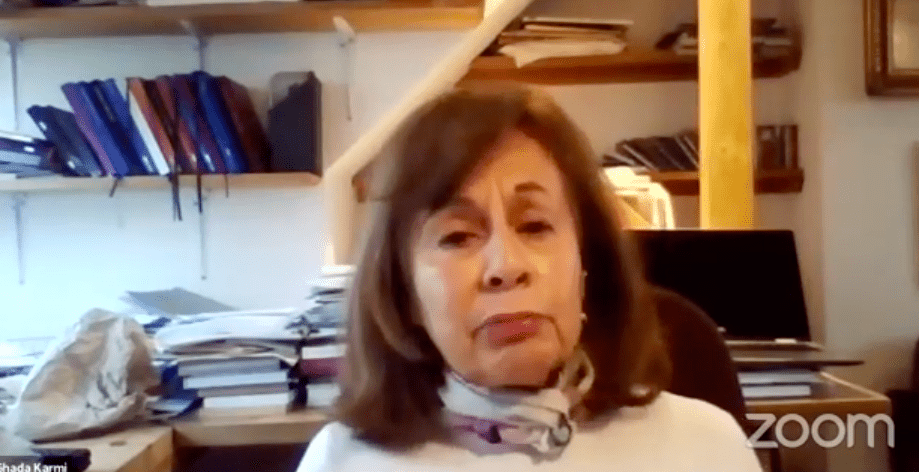
The advantages of a position like this are that it is readily understandable by western population because we have a history of civil rights movements in the west, such as the South Africa example. Hence, we are asking for something that is only considered fair. Secondly, it deposits Israel with a real problem because if you’re saying to the Israel governemnt, that you are sitting in a territory that is predominantly inhabited by Arabs but you are not giving us any rights and we want these rights, it ultimately means, these people are demanding rights as citizens of that state – this is a problem for Israel because it exposes them as a sovereign ruler over all these people. Supposing Israel was forced into conferring equal rights on the Palestinian Arabs, it has the immediate effect of threatening the Zionist nature of the state, it is the most direct way of ending Zionism.
It poses Israel with a problem, either being seen as a brutal coloniser or an apartheid state. Such a demand exposes the reality and makes the message very clear. When a western state support Israel and they are supporting an apartheid state.
The logical result of this movement is a democratic country where all citizens are equal, leading to representation in parliament which leads to the question to the right of return. This is the quickest and most direct route to exposing Israel for what it really is and forcing it into a position in which whatever it does is wrong.
The last speaker for the webinar was Michel Warschawski, based in Al Quds, founder of the Alternative Information Centre, research and political analyst, anti-colonial activist:
It is not a matter of choosing between one state or two states. There are more than two options, such as a united Arab world with national minorities. We can look at many options beside a one state vs two-state debate. Our task as activists is not to debate about an eventual future solution but rather to change the actual relation of forces in order to put a solution on the agenda. The present stage is a stage of resistance, not of liberation. You have different ways of behaving and strategies among the people and leadership in the phases of up or down the hill.
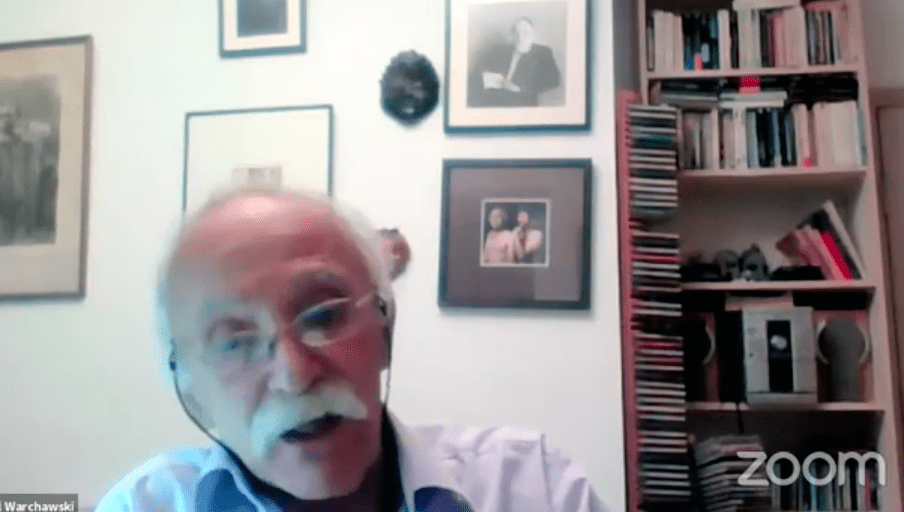
Instead of spending time around the issue of what should be, we should focus ourselves on what should be done with one urgent strategy task to definitely end the catastrophic Oslo paradigm. In the Palestinian and pro-Palestinian discourse you clean the space from this deadlock and illusion. Stating the end of Oslo framework, which was with us for much too many years, the duty of the PLO and all the Palestinian activists and all the supporters is to reflect on a national liberation strategy now. I was a young Jewish French, from a political family and I remember the political discussions we had in high school and at the Saturday dinner with my family about what should be the solution to the Algerian “crisis” – this was the concept at the time, not conflict but “crisis”. What should be solution? To give citizenship to Muslims, to have autonomy and to be a kind of semi-independent state in the framework of the French empire. These were the discussions, as long as French colonialism and the French army looked stable enough, these were completely abstract discussions. When relational forces changed on the ground, when the Algerian national movement were strong enough to change the relational forces, it was the end of the discussion.
We are not in a moment of solution to colonialism in Palestine. This is why we are in a phase of resistance. When the relational forces regionally and locally will change for the good. This solution will impose itself. None of us can predict what the solution will be on the ground. This is why I believe we shouldn’t spend too much time discussing the solution but much more what to is to be done now in order to put a solution on the agenda.
Q&A:
Questions and comments from Nargess and the audience asked about whether Joe Biden would bring the two-state solution discussion back on the agenda, the prospect of working with Israelis for a one democratic state, the unpredictability timeline for the progress of Palestine and lastly, the speakers offered wise and practical advice for the younger generation about the Palestinian struggle.

